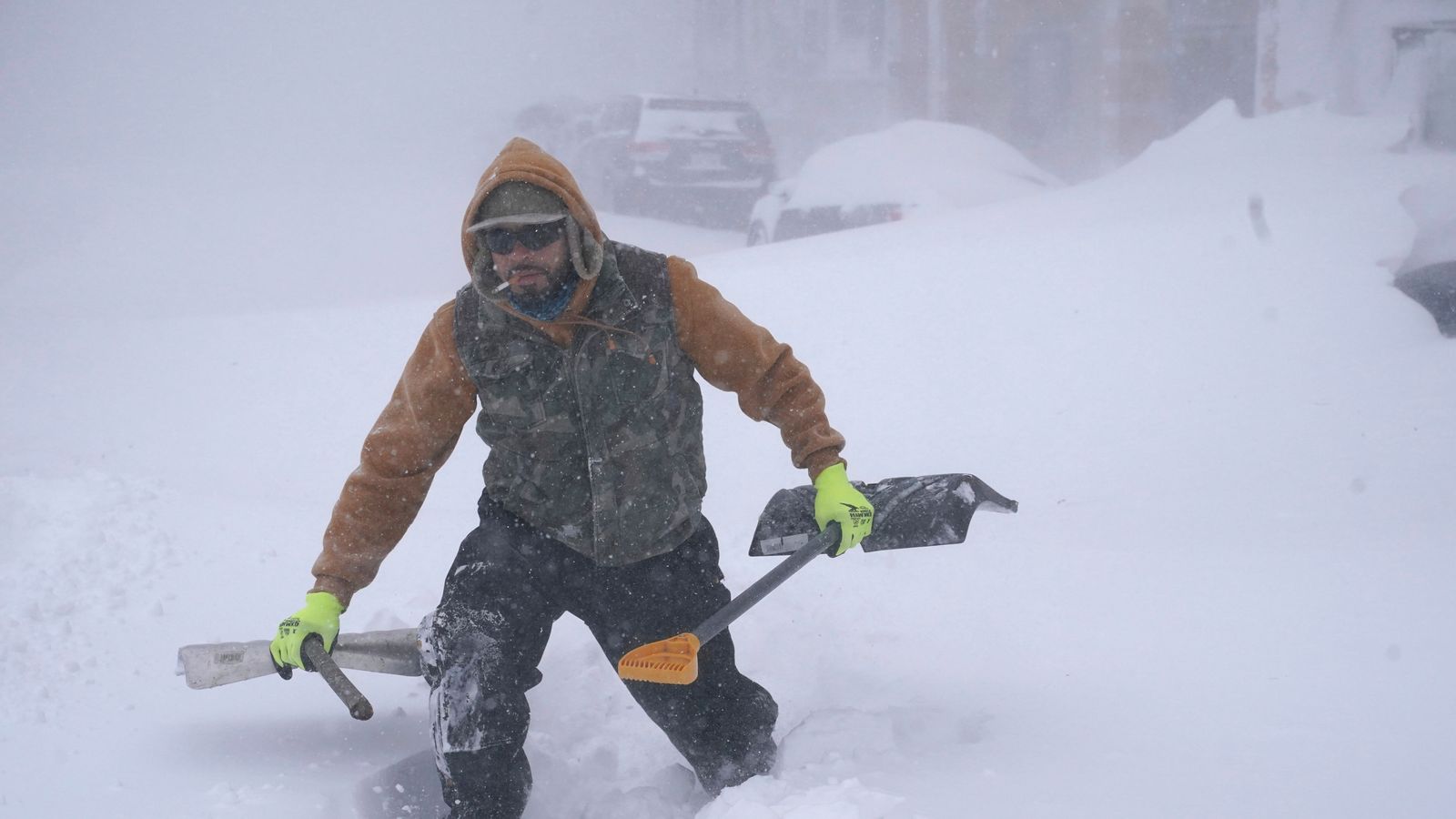US bomb cyclone: At least 28 dead and hundreds of thousands of homes without power in brutal storm

At least 28 people have died in the US as the country grapples with a brutal winter storm.
Blizzard conditions have left almost 380,000 homes and businesses without power, with more than 200 million people under some form of weather warning as temperatures plunge to well below freezing.
More than 3,000 flights were cancelled on Saturday, with some airports closed.
Live updates: Number of dead rises as impact of storm spreads
Warning of 90mph winds and 20cm of snow
Icy conditions on the roads prompted many authorities to warn against non-essential travel, and hundreds of people who did venture out found themselves stranded in their vehicles.
Among those who have died are three people in car crashes in Kentucky, and another three in Oklahoma, two of which happened as winds blew the drifting snow.
In Montana, the National Weather Service warned that the eastern slope of Glacier National Park and nearby foothills and plains could see up to 20.3cm of snow and winds of up to 90mph.
Montana saw a temperature of -45.6C (-50F) earlier in the storm, while yesterday’s low belonged to the remote town of Havre – also in Montana – which saw -39C (38F).
Advertisement
In Maine, more than 125,000 properties are without power and utility bosses have warned it could take days before supply is restored, while some other states have asked customers to cut back on their usage to avoid rolling blackouts.
Read more:
In pictures: US gripped by deep freeze as bomb cyclone hits
What is a bomb cyclone? The extreme winter storm hitting US
Please use Chrome browser for a more accessible video player
0:53
Planes struggle to land in US
Fears rise for homeless
One company told its 65 million customers in 13 states that power plants were struggling to operate under the pressure of the weather and the extreme demand.
Another power company asked customers to drop their thermostats from 15.6C to 16.7C because a pipeline equipment failure had temporarily cut the gas coming from one of its suppliers by 30%.
Emergency shelters are being opened for those who are homeless or have no power at home, and there are also urgent efforts to get firewood to some Native American tribes who live in isolated areas.
• Colorado: Two “environmental exposure” deaths
• Kansas: three traffic accidents – in Republic County a 60-year-old man died after his car was struck by another vehicle that had lost control and jack-knifed; A 33-year-old man died after he lost control of his truck and spun across the median of Interstate 70 in Geary County; and in Saline County, a 21-year-old man died after the SUV he was a passenger in went into a ditch
• Kentucky: Two vehicle-related deaths and one homeless person who died from exposure
• Four deaths in a 46-car pile-up near Sandusky, and a further four deaths after a crash in Franklin Township when a tractor-trailer driver went through the barrier and hit cars coming the opposite direction
• Nebraska: One weather-related vehicle death
• Missouri: A man died after losing control of his vehicle on an icy road, going down an embankment, over a cement wall and landing upside down in a creek
• New York: Four deaths
• Oklahoma: Three road deaths
• Michigan: An 82-year-old woman in Lansing died after being found curled up in the snow outside her assisted living community
• Tennessee: A man was found dead in Memphis. Authorities have not given details but say the death is weather-related
• Wisconsin: Troopers were at the scene of an accident and passing drivers were slowing down when a second crash occurred – a pick-up truck left the road and struck a tractor-trailer unit. The truck driver died
In Portland, Oregon, severe weather shelters gave out tarpaulins and tents to people as the centres themselves closed due to a break in the bad weather.
More than 1,100 people had sought warmth at the city’s five emergency weather shelters, officials said.
Please use Chrome browser for a more accessible video player
1:55
‘I don’t know how they’ll survive’
‘One of the worst storms in history’
In Buffalo, New York, deep snow, freezing temperatures and power cuts encouraged people to seek churches, police stations and anywhere else that might have heating.
Erie County executive Mark Poloncarz said ambulances needed more than three hours for a single trip to a hospital, with roads still hampered by snow, abandoned cars and downed power lines.
New York governor Kathy Hochul said the storm was “one of the worst in history”, and Timothy Carney of the Erie County Sheriff’s Office said: “It’s essentially a category 3 hurricane with a bunch of snow mixed in. It’s been like that for the past 24 hours.”